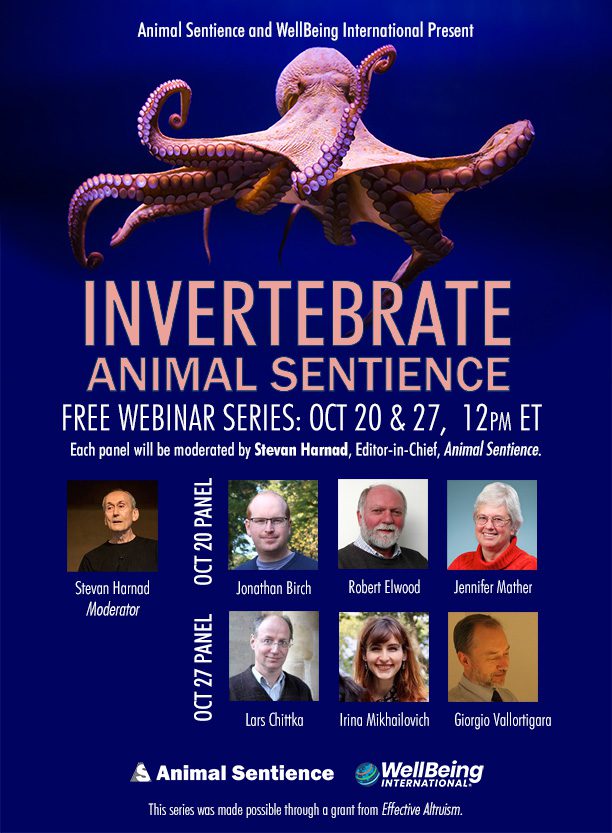
Sep 16, 2021 Webinar Series: Invertebrate Animal Sentience
The term sentience – referring to the ability to feel pleasures and pains – was used by philosophers in the 17th century to distinguish the capacity to feel from an ability to think or reason. This distinction was directly expressed in Jeremy Bentham’s famous phrase at the end of the 18th century that has become a foundational element of the modern animal welfare movement – “The question is not, Can they reason? nor, Can they talk? but, Can they suffer?”
Following Bentham’s phrasing of this animal welfare question, animal advocates over the past 75 years have pressed to cover an increasing range of animal species in their advocacy. Initially, such advocacy focused mainly on mammals and sometimes on birds. Still, animal advocates have broadened their efforts over the last fifty years to ensure that all vertebrates are included in legislation to prevent cruelty to animals. More recently, concerns regarding the sentience of octopi have led to the inclusion of cephalopods in specific animal protection systems (e.g., animal research regulations in the EU).
Nevertheless, there is still debate over the ability of some vertebrates to experience pain and pleasure. For example, as recently as the 1980s, there was a widespread belief in the medical community that the human neonate or fetus may not be capable of perceiving pain. As a result, most invasive surgeries on neonatal humans in the USA were conducted without general anesthesia. Today, while we are still arguing over whether fish can experience pain and suffering (see, for example, Key 2016), some discussions of an animal’s capacity to feel distressed or pleasure extend to invertebrate phyla. The recent documentary, My Octopus Teacher, has raised public awareness about the extraordinary abilities of octopi and generated questions about their capacity for sentience. Researchers have also investigated the ability of some insects and crabs to experience negative states and to modify their behaviors to avoid such negative stimuli.
Thanks to a grant from the Center for Effective Altruism, WellBeing International will be hosting two webinars on Invertebrate Animal Sentience, moderated by Dr. Stevan Harnad, founding editor of Behavioral and Brain Sciences and current Editor-in-Chief of Animal Sentience. Dr. Harnad will be joined by a diverse panel of experts: philosopher Jonathan Birch, neurobiologist Robert Elwood and psychologist Jennifer Mather on October 20th, and cognitive scientist Giorgio Vallortigara, biologist Lars Chittka and philosopher Irina Mikhalevich on October 27th, for wide-ranging conversations on the sentience of crabs, lobsters, bees, octopi and other invertebrate animals long considered too simple to experience feelings of distress, pain and pleasure. To learn more and register, visit https://wellbeingintl.org/get-involved/webinars/.




